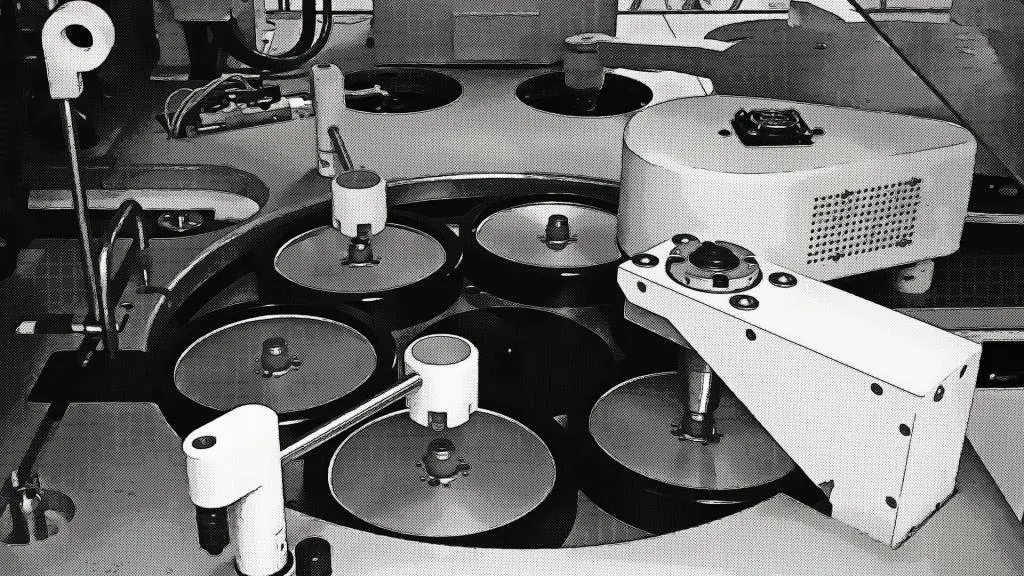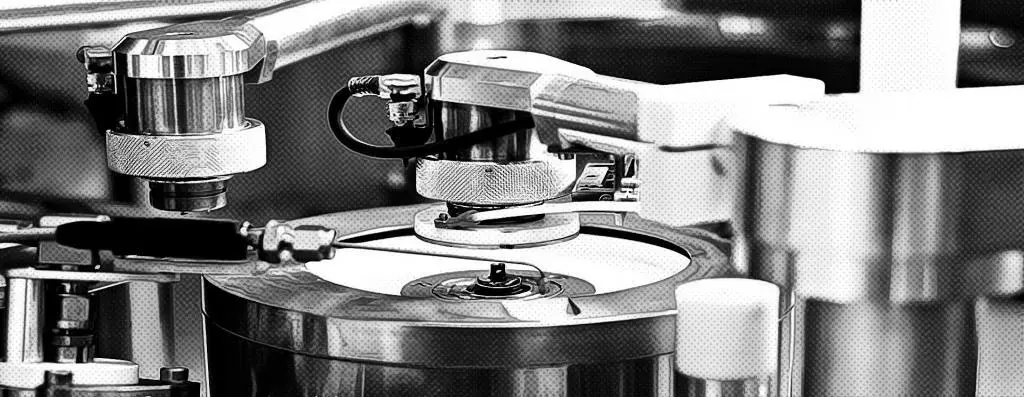CD pressing is the process of manufacturing CDs (compact discs) in large quantities using specialized equipment. The process involves creating a glass master, which is a master copy of the disc’s data that is used to create the metal stampers that will press the data onto the final CD.

As a short definition, CD Pressing is the process of creating multiple copies of a CD from a master copy.
The process involves creating a glass master of the original CD and using it to create nickel stampers that are then used to press the CDs from polycarbonate substrates. CD pressing is the preferred method for creating large quantities of CDs that need to have a professional look and sound.
What is CD Pressing: Table of Contents
Brief History of CD Pressing
The history of CD pressing dates back to the late 1980s when CDs first became a popular medium for music distribution. At the time, the only way to create copies of a CD was through duplication, which was a slow and expensive process. As demand for CDs grew, manufacturers started to explore alternative methods of mass production. This led to the development of CD pressing technology, which made it possible to create large quantities of CDs quickly and affordably.
The first CD pressing plants were established in Europe and Japan in the late 1980s. These plants used the same technology that was used to press vinyl records, but with some modifications to accommodate the digital format of CDs. By the early 1990s, CD pressing had become the standard method for producing CDs and was widely used throughout the music industry. Today, CD pressing is still used to create high-quality CDs for a variety of purposes, including music, data storage, and software distribution.
CD Pressing Process
CD pressing process is a complex and precise manufacturing process that requires specialized equipment and expertise.
Detailed Steps in the CD Pressing Process
- Submission of master disc: The first step in the CD pressing process is to submit a master disc to the CD pressing company. The master disc is a high-quality recording of the music or data that will be replicated onto the final CDs.
- Creation of glass master: Once the master disc is received, the CD pressing company creates a glass master from it. The glass master is a precise copy of the master disc that is used to create the stampers used in the replication process.
- Creation of nickel stamper: The glass master is then used to create a nickel stamper. The stamper is used to transfer the data from the glass master onto the final CD discs.
- Metalization of polycarbonate substrates: Next, the polycarbonate substrates are metalized. This involves coating the substrates with a thin layer of metal that will allow the data to be transferred from the stamper onto the CD.
- Injection molding of polycarbonate substrates: The metalized polycarbonate substrates are then injected with the melted polycarbonate plastic, which will form the physical shape of the CD.
- Label printing: Once the CDs have been molded, they are printed with any necessary labels or graphics. This can include printing on the surface of the CD itself, as well as printing on the booklet or packaging that comes with the CD.
- Final assembly and packaging: Finally, the replicated CDs are assembled and packaged. This can involve shrink-wrapping the CDs, inserting them into jewel cases, and including any necessary booklets or other printed materials.
Advantages of CD Pressing

CD pressing offers several advantages over other methods of CD production. Here are some of the most significant advantages:
Higher Quality Sound
One of the biggest advantages of CD pressing is that it produces a higher quality sound than other CD production methods. This is because the replication process used in CD pressing produces an exact copy of the master disc, which ensures that the sound quality of the replicated CDs is consistent and of the highest quality.
More Professional Appearance
Another advantage of CD pressing is that it produces CDs with a more professional appearance. Replicated CDs have a polished, high-quality look and feel that is difficult to achieve with other production methods. This is especially important for musicians, record labels, and businesses that want to create a professional image for their products.
More Durable and Long-Lasting
CDs produced through pressing are also more durable and long-lasting compared to other CD production methods. The injection-molded polycarbonate substrates used in the CD pressing process are highly resistant to scratches, smudges, and other types of damage that can occur during normal use. As a result, replicated CDs can withstand more wear and tear and are less likely to become damaged or unplayable over time.
Replicated Discs vs. Duplicated Discs
When it comes to manufacturing CDs, there are two primary methods: replication (or pressing) and duplication (or burning). Replication involves creating a glass master from the original master disc and using it to stamp polycarbonate substrates with a nickel stamper. The metalized substrates are then injection molded to create an exact replica of the original disc. On the other hand, duplication involves burning the music onto a blank CD-R using a duplication tower or computer burner.
Comparison of the Pros and Cons of Replicated and Duplicated Discs
- Quality of Sound: Replicated discs are generally considered to have higher sound quality than duplicated discs. This is because replication creates an exact replica of the original master, resulting in a more accurate and consistent sound. Duplicated discs, on the other hand, may suffer from inconsistencies in sound quality due to variations in burning speed or disc quality.
- Cost: Duplicated discs are generally cheaper to produce than replicated discs, especially for smaller runs. This is because duplication doesn’t require the creation of a glass master or nickel stamper, which can be expensive. Replication is more cost-effective for larger runs, where the cost per unit can be lower.
- Turnaround Time: Duplicated discs have a faster turnaround time than replicated discs. This is because duplication can be done using a duplication tower or computer burner, which allows for quicker production. Replication, on the other hand, requires the creation of a glass master and nickel stamper, which can take longer to produce. However, replication may be faster for larger runs, as the injection molding process can be more efficient than burning each disc individually.
CD Pressing for Independent Artists and Small Labels
CD pressing is an important part of the music industry, especially for independent artists and small labels. By pressing CDs, these musicians and labels can ensure that their music is available to a wider audience and that it has a physical presence that can be sold at shows, online, and in stores. CDs are also an excellent promotional tool, making them perfect for artists who are looking to build a fan base and gain exposure.
How to Choose a CD Pressing Service
When it comes to choosing a CD pressing service, there are a few key factors to consider. First, it’s essential to find a service that offers high-quality products that meet your specific needs. Look for a company that has a proven track record of producing excellent CDs and that can provide references and samples of their work.
Second, consider the turnaround time and cost of the service. Small labels and independent artists often have limited budgets, so it’s important to find a pressing service that offers competitive pricing without sacrificing quality. Additionally, ensure that the service has a reasonable turnaround time, so you can get your CDs in a timely manner.
Finally, consider the customer service and support that the pressing service offers. Look for a company that has knowledgeable and responsive customer service representatives who can answer your questions and provide guidance throughout the pressing process.
Importance of Mastering for CD Pressing
Mastering is the final step in the music production process and is essential for creating high-quality CDs. During mastering, the music is balanced, equalized, and optimized for CD pressing. This process can help to ensure that your CDs sound as good as possible and that they are consistent across different listening environments.
Independent artists and small labels should consider hiring a professional mastering engineer to ensure that their music is optimized for CD pressing. While it may be tempting to cut costs by skipping this step, doing so can result in a subpar product that may not meet the high standards of the music industry.

